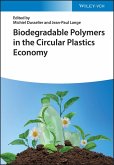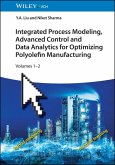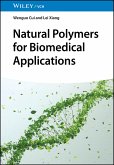Biodegradable Polymers in the Circular Plastics Economy
A comprehensive overview of the burgeoning field of biodegradable plastics
As the lasting impact of humanity's reliance on plastics comes into focus, scholars have begun to seek out solutions to plastic litter. In Biodegradable Polymers in the Circular Plastics Economy, an accomplished team of researchers delivers a focused guide (1) to understand plastic degradation and its role in waste hierarchy besides recycling, and (2) to create and use biodegradable plastics where appropriate. Created preferably from renewable resources, these eco-friendly polymers provide an opportunity to create sustainable and lasting solutions to the growing plastic-driven pollution problem.
The broad approach to this handbook allows the authors to cover all aspects of these emerging materials, ranging from the problems present in the current plastics cycle, to the differences in type, production, and chemistry available within these systems, to end-of-life via recycling or degradation, and to life-cycle assessments. It also delves into potential commercial and policy issues to be addressed to successfully deploy this technology.
Readers will also find:
Biodegradable Polymers in the Circular Plastics Economy is the perfect overview of this complicated but essential research field and will appeal to polymer chemists, environmental chemists, chemical engineers, and bioengineers in academia and industry. The book is intended as a step towards a circular plastics economy that relies heavily on degradable plastics to sustain it.
Hinweis: Dieser Artikel kann nur an eine deutsche Lieferadresse ausgeliefert werden.
A comprehensive overview of the burgeoning field of biodegradable plastics
As the lasting impact of humanity's reliance on plastics comes into focus, scholars have begun to seek out solutions to plastic litter. In Biodegradable Polymers in the Circular Plastics Economy, an accomplished team of researchers delivers a focused guide (1) to understand plastic degradation and its role in waste hierarchy besides recycling, and (2) to create and use biodegradable plastics where appropriate. Created preferably from renewable resources, these eco-friendly polymers provide an opportunity to create sustainable and lasting solutions to the growing plastic-driven pollution problem.
The broad approach to this handbook allows the authors to cover all aspects of these emerging materials, ranging from the problems present in the current plastics cycle, to the differences in type, production, and chemistry available within these systems, to end-of-life via recycling or degradation, and to life-cycle assessments. It also delves into potential commercial and policy issues to be addressed to successfully deploy this technology.
Readers will also find:
- A thorough introduction to biodegradable polymers, focusing not only on the scientific aspects, but also addressing the larger political, commercial, and consumer concerns
- Mechanisms of biodegradation and the environmental impact of persistent polymers
- An in-depth discussion of degradable/hydrolysable polyesters, polysaccharides, lignin-based polymers, and vitrimers
- Management of plastic waste and life cycle assessment of bio-based plastics
Biodegradable Polymers in the Circular Plastics Economy is the perfect overview of this complicated but essential research field and will appeal to polymer chemists, environmental chemists, chemical engineers, and bioengineers in academia and industry. The book is intended as a step towards a circular plastics economy that relies heavily on degradable plastics to sustain it.
Dieser Download kann aus rechtlichen Gründen nur mit Rechnungsadresse in D ausgeliefert werden.
Hinweis: Dieser Artikel kann nur an eine deutsche Lieferadresse ausgeliefert werden.









